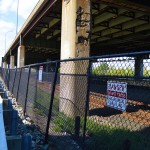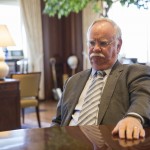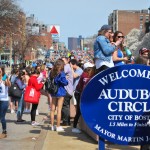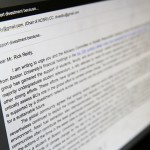Boston Mayor Martin Walsh met with local residents at Suffolk University’s School of Law for the first of nine Boston 2024 Olympic bid community meetings on Thursday night. The meeting addressed citizens’ questions and issues on planning and preparation.
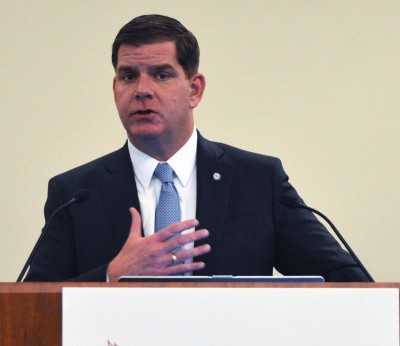
Walsh said Boston’s selection by the United States Olympic Committee to be the U.S. bid to host the 2024 Olympics is an opportunity for international recognition, economic development and infrastructural improvement.
“It’s an opportunity for us to grow,” Walsh said at the meeting. “Ask every question you want to ask, but also, look and see what I think is an option for us to showcase our city around the world.”
Residents in support and in opposition of Boston’s 2024 Olympic bid touched on issues surrounding infrastructure, as well as the social and economic impacts.
John Fitzgerald, the Mayor’s liaison for the bid, and panelists John Fish, chairman of Boston 2024, and Richard Davey, president of Boston 2024, led the meeting that centered around the questions of those who chose to speak. Other local officials and those affiliated with the bid attended and spoke during the meeting as well.
Panelists presented further plans on the preparation for the bid focusing on legacy, values and increasing future opportunities for Boston.
Fish said Boston 2024 aligns with Walsh’s plans for better housing in 2030, as outlined in his State of the City address, and expands the values of the city.
Fish also said the Olympics reflects the supportive, youthful and educational essence of “Boston Strong,” and that this process has the potential to transform Boston for the next generation.
“The Olympic movement is all about pride in our country, pride in our Commonwealth, pride in our city,” Fish said. “Even if we don’t win, we already won. Everybody unites to do what’s best for our city.”
David Manfredi, the Boston 2024 architect, shared the architectural plan with the goal of having a walkable venue. The plan proposed the “Waterfront Cluster” and “University Cluster” as two main arenas where 28 out of 33 venues would be within a 10-kilometer distance. The plan also proposes opportunities to create the platform of what will be a future neighborhood without permanent displacement.
“The games can and will be dedicated for the city and the future of Boston,” Manfredi said of the plans.
Manfredi also proposed beach volleyball on the Boston Common with the goal of reinvesting the area for recreational value.
Cheri Blauwet, a Paralympic athlete in favor of the bid, said the plan would be about exploring the Common and coming together in solidarity. However, several citizens objected to the Common’s proposed use for beach volleyball.
During a questioning session, Mary Fran Townsend from Downtown Boston proposed the use of several beaches around Boston as venue alternatives for beach volleyball. She also asked that the Common and Public Garden be free of Olympic activities.
Walsh responded that it would depend on the binding of the referendum, but that it’s still too early to tell.
Several citizens also showed their support of a Boston 2024 Olympics during the questioning session. Nestor Garcia, of Hyde Park, spoke up during the meeting to say the Olympics would move Boston forward by bringing all the plans into reality.
Kathy Maloney, of West Roxbury, also supported the bid. As a volunteer in two Paralympic Games and the London 2012 Olympics, she spoke of her experience witnessing the “phenomenal legacy of the Olympics” with the support and rally of the community.
“The opportunity for the games in the United States is beyond compare,” Maloney said in the meeting.
Several attendees said they believed that holding the Olympics in Boston would be good for the city, and they had high hopes for the community meetings.
Eli Wolff, 37, of Newton, said citizens were being appropriately informed and hoped the next meeting was even better.
“They did a really nice job. They’re educating and putting awareness and being able to get people thinking and talking about it,” he said. “Hopefully there will be more information in further meetings. Even so, it’s still a good start. I definitely think it’s a good opportunity. I think there’s still a lot of work to be done, but I know there’s a great potential.”
Bernie Andrews, 40, of South Boston, said he is open to having Boston host the 2024 Olympics and the community meetings are valuable.
“The meeting gave the supporters a chance to convey their messages and points to the people,” he said. “Those who oppose had the opportunity to have their voices heard.”
Marty Murphie, 60, of Cambridge, said he was undecided about whether he was a supporter or not, but that in the future, he hoped for more voices at the meetings.
“The first meeting went OK. I’m hoping for more expressed opinions in the future and more involvement from local communities,” he said. “I’m actually still in the middle between yes-or-no to Olympic 2024, but I do think that nonetheless, infrastructure is a matter to be improved.”

